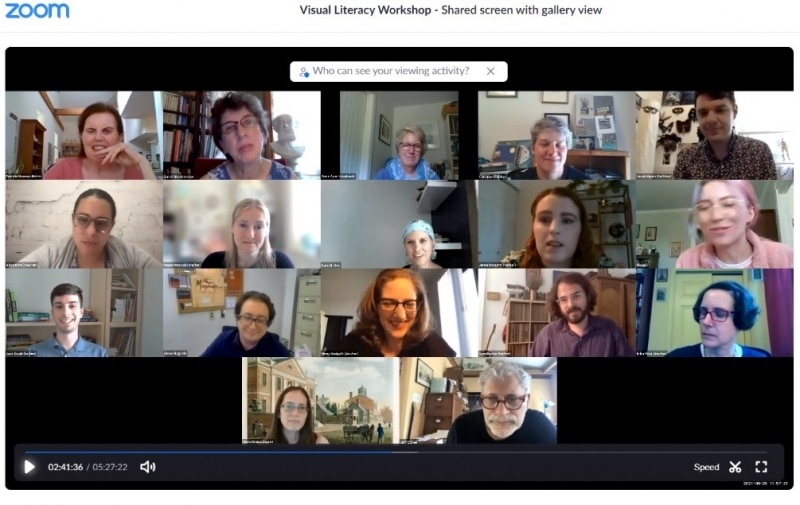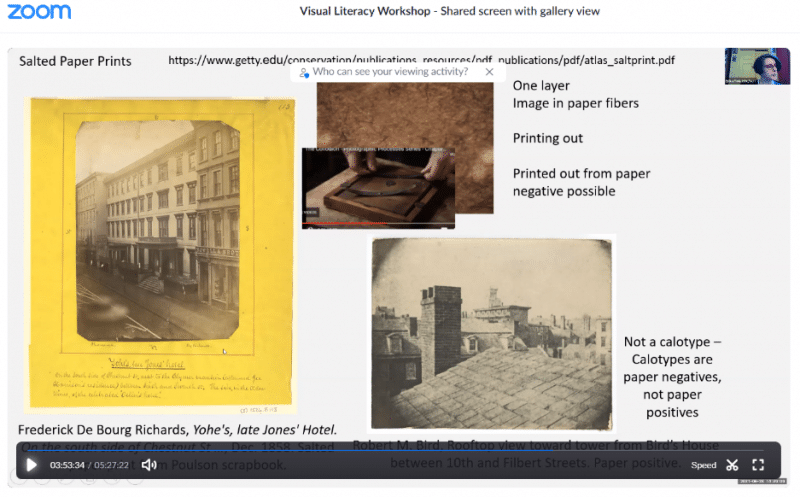Virtual Close Looking: The Library Company’s First Visual Literacy Workshop
With generous support from the Terra Foundation for American Art and the Center for American Art, Philadelphia Museum of Art, fifteen selected applicants gathered virtually, from June 28 through June 30, to attend the Library Company’s first-ever visual literacy workshop, Urban In-sights: A Workshop in American Visual Culture and Literacy from the Eighteenth through the Early Twentieth Century. The workshop, attended by graduate students, professors, archivists, and curators from around the country, served as an opening program for the Imperfect History exhibition, funded by the Henry Luce Foundation, which will be on display beginning on September 20, 2021.
Like everything else in the world, Urban In-sights was impacted by the COVID-19 pandemic. Originally scheduled for the summer of 2020, the workshop was postponed with the hope of it being held in person at a later date. Gathering a group of people together indoors did not seem feasible when the time came to decide on the format of the rescheduled workshop. Workshop organizers and instructors Sarah Weatherwax, Senior Curator of Graphic Arts, Erika Piola, Curator of Graphic Arts, and Anne Verplanck, Associate Professor of American Studies at Pennsylvania State University, Harrisburg pivoted to reconceptualize the workshop as a virtual program. How does one guide attendees in close looking at visuals and in understanding how to recognize different printing and photographic processes when not physically together? The answer was to purchase graphic materials from eBay to create “historical process packages.” Each attendee was mailed a magnifier and a packet containing a lithograph, a tintype, a photomechanically printed postcard, an albumen photograph and other examples of historical printing processes to refer to during the online presentations and to keep for future reference.
Throughout the three days, attendees watched PowerPoint presentations by Piola, Weatherwax, and Verplanck covering topics such as early photographic processes, lithography, and intaglio printing. Guest lecturers included Dr. Wendy Woloson of Rutgers University and Dr. Jeff Cohen of Bryn Mawr College. Photographer Lisa Elmaleh gave a demonstration of how to make a tintype from her studio in Paw Paw, West Virginia. During the last afternoon of the workshop each attendee gave a short presentation on a pre-selected graphic item from the Library Company’s collection and described how attending the workshop impacted how they interpreted the item.
While everyone agreed that the remote format was not ideal, the attendees provided positive feedback about their workshop experiences. “After a challenging year, the workshop reenergized me as a curator. I am now less intimidated by our prints, drawings, and photographs collection,” wrote one attendee. “As a staff of two,” commented another attendee, “my newly gained knowledge in the areas touched on in the workshop, [will] grow the knowledge of our entire staff; I plan on imparting what I know to my boss and our student workers and interns.” Another attendee wrote: “I have a better understanding of the various processes as well as how they bleed together. While I am not sure I am surprised, … I always find [it] interesting the various ways people interpret what they see – not only given the sources available but also what reflects their interests. In many respects, it was a good reminder of unconscious bias!”
With the successful completion of the visual literacy workshop and the recent launch of the digital catalog, we feel that our Imperfect History project is off to a wonderful start. Next step—the exhibition opening in late September!
Sarah J. Weatherwax, Senior Curator of Graphic Arts
Imperfect History is supported by the Henry Luce Foundation, Walter J. Miller Trust, Center for American Art, Philadelphia Museum of Art, Jay Robert Stiefel and Terra Foundation for American Art.





